1) Hi Nada, can you tell us what you've been up to since graduating from THINK Global School in 2022? Since graduating in 2022, I've been pursuing a passion I found while at TGS, sustainability, and I am currently majoring in engineering in renewable energy systems at Al Akhawayn University, in Ifrane, Morocco. But there is way more than that! I've had a chance also to explore the world of...
Read MoreIf you are new to THINK Global School’s approach to learning, some of the terms we use might seem as foreign as the places our students call home. But that’s ok — we’re here to help clear things up! One term in particular that all prospective students and their parents should become familiar with is learning targets, and in this post we’ll explain what they are, and why they are an integral component of our curriculum.
Learning targets serve as the backbone of THINK Global School’s Changemaker Curriculum. At their core, learning targets provide a measuring stick against which our students can assess their acquisition of knowledge during self-directed projects and teacher-led modules. To put it more simply, our learning targets provide a clear statement of what the student and their educators wish to accomplish during a project, while still allowing the student to maintain ownership of their learning.
Throughout their time at THINK Global School, students gain an education by participating in projects that are relevant to the world around them. These projects come in two forms: teacher-led modules, which are established prior to the start of the term and led by two of our educators, and student-designed projects, which are created by our students either individually or in teams, once in country. These student-designed projects are more flexible, and provide students agency to explore concepts of their own choosing. The commonality between our teacher-led modules and student-designed projects, however, is that they are both created with THINK Global School’s learning targets as their foundation.
Including 21st century skills (skills to be applied to our host countries and the world), there are ten different categories containing many subcategories of learning targets, which collectively represent a broad spectrum of learning. And because projects at THINK Global School are multidisciplinary, they typically consist of learning targets from numerous categories.
How to Measure Learning
The Learning Targets categories and subcategories are:
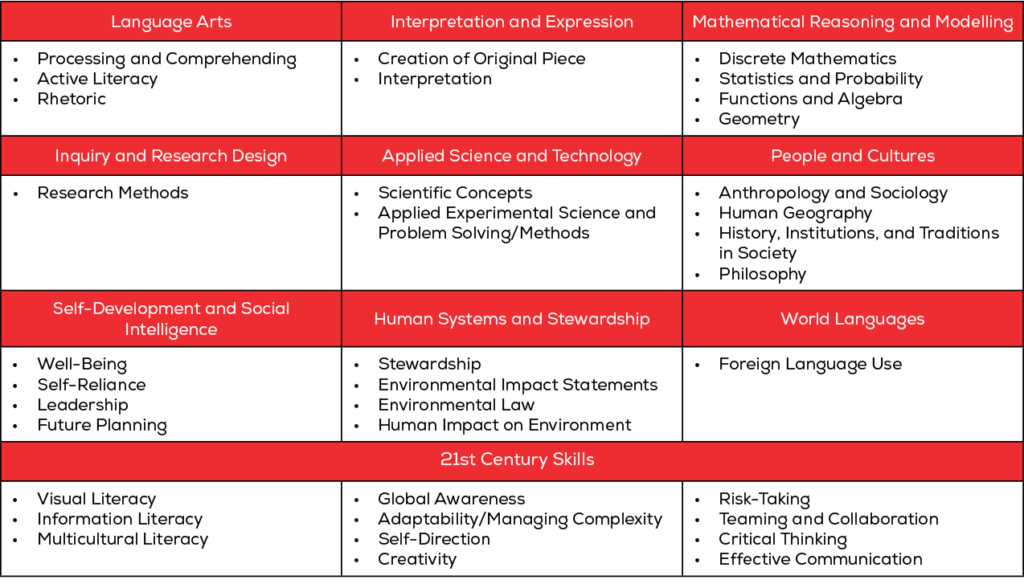
Each of these sub-categories is made up of numerous learning targets, and there are 122 learning targets in all. As an example, the learning targets associated with World Languages: Foreign Language Use subcategory are:
-
Showing evidence of comprehension through the functional application of information communicated by others in a language other than English;
-
Using the language to communicate simple to complex information to others (both orally and in written form);
-
Developing a minimum language skill set for each host country
And the learning targets associated with the Mathematical Reasoning and Modelling: Discrete Mathematics subcategory are:
-
Extending understanding and awareness of various number systems.
-
Evaluating solutions and conclusions in the context of the problem through estimation, measurement accuracy, error, and tolerances
-
Developing techniques for constructing proofs in one or more areas of mathematics
-
Solving problems by applying principles of computational and algorithmic thinking
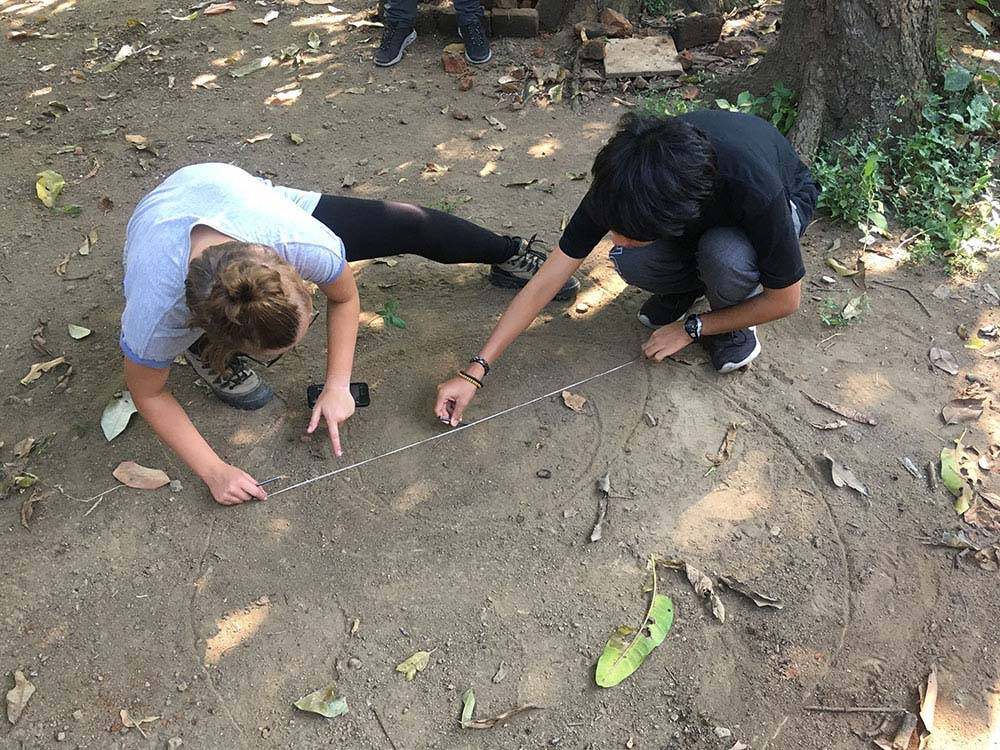
Students participate in the From Zero to Infinity module, which features five mathematics learning targets
Graduation Requirement
All students must achieve the rank of novice in all of our learning targets, the rank of specialist in 70% of our learning targets, and complete one mastery project to meet the graduation requirements for THINK Global School. These standards ensure that every TGS student receives a comprehensive education while also allowing them to focus on the learning targets and applicable skills they genuinely care about. Take a student who is scientifically inclined, for example. They might choose to base their mastery project around the learning target of applied experimental science, creating a sustainable energy plan that explores the relationship between matter in its different forms and the energy that can be produced by converting it into fuel. While they choose to focus on mastering scientific concepts through their project work, they will also need to participate in teacher-led modules or student-designed projects that incorporate the other learning target categories to ensure they meet the requirements for graduation from THINK Global School.
Assessment and Mastery at THINK Global
In line with our place- and project-based learning methodology, we believe that student assessment needs to be authentic, relevant, individualized, and focused on growth. Guided by TGS learning targets, our assessment philosophy is based on two principles: excellence and mastery, which is governed by the levels of Bloom’s Taxonomy.
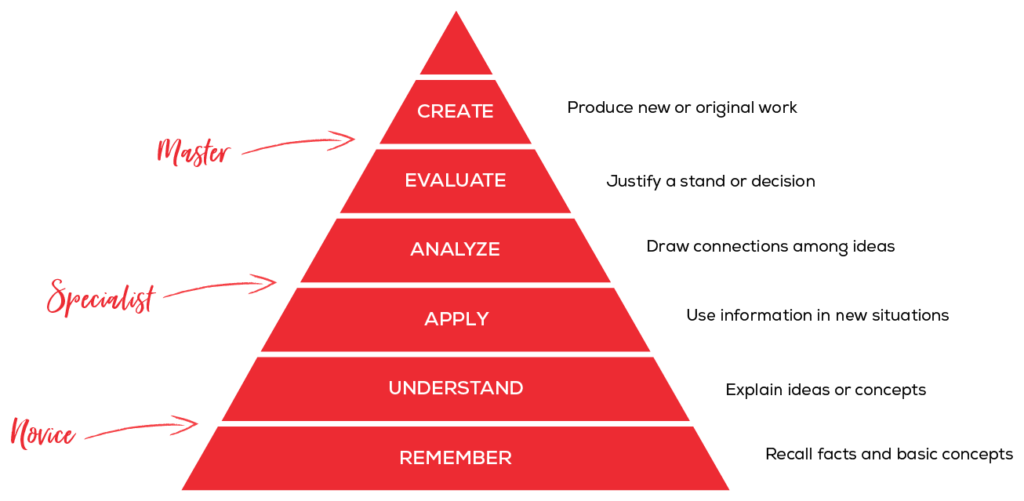
To move up in learning target rank, students must demonstrate that they meet that rank’s requirements. To become a novice, they must show a basic level of competence in the selected learning targets by being able to understand and remember the learned skills/acquired knowledge. To become a specialist, students need to show a high level of competence by being able to evaluate, analyze, and apply the learned skill/acquired knowledge. To become a master, a student must show the highest level of competence in the selected learning target by teaching their peers/community their learned skills/acquired knowledge.
Each term students select one of three teacher-led modules to participate in. These project-based modules are country-specific and draw from social, economic, geographic, and cultural themes that are highly relevant to the local community. Learning targets for the teacher-led modules are pre-established, giving students an opportunity when selecting their module to focus on the targets that they’d like to continue building their mastery in, or alternatively, ones they have little experience in and would like to improve on.
An example of a teacher-led module from our Oman term is Marine and Coastal Studies, which has students answer the driving question of “How can we use science to inspire passion for marine tourism in Oman?”. The learning targets associated with this multidisciplinary module are:
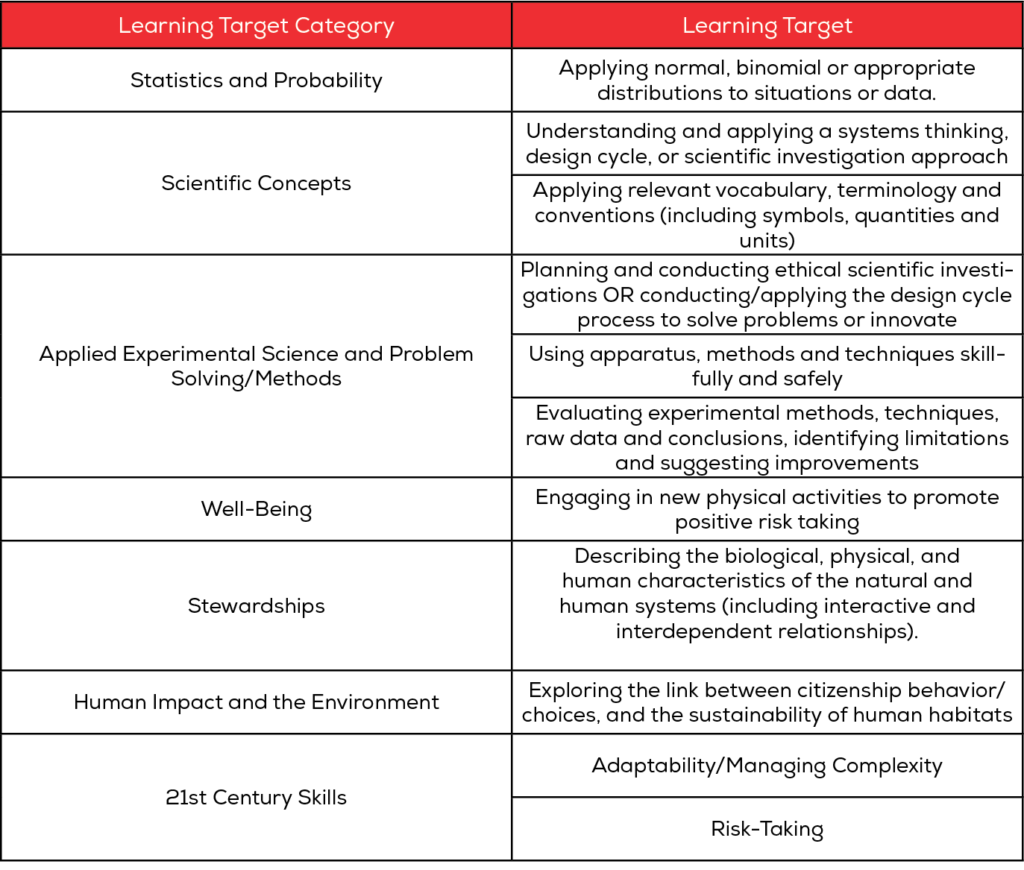
At the beginning of the term, students will list their expectations for their project work and then revisit and reflect on those expectations at the term’s end. In the next section, we’ll look a bit at how learning targets tie into the end-of-term narrative report.
Excellency
To assess their expectations for excellence in regards to module work and personal projects, students, together with educators, design criteria for their rubrics at the start of the term, after which students individually define what excellence means to them for that specific project. Students then use these excellency rubrics to determine their grades at the end of the term, in consultation with their advisors and educators.
For example, in Botswana students take part in a module centered around conservation and storytelling. At the start of the term, students and educators identify the essential elements of storytelling. Their rubric elements might look like this:

With these elements identified, each student sits down and writes an excellency paragraph detailing what they would like to accomplish during the term in their teacher-led module and personal projects.
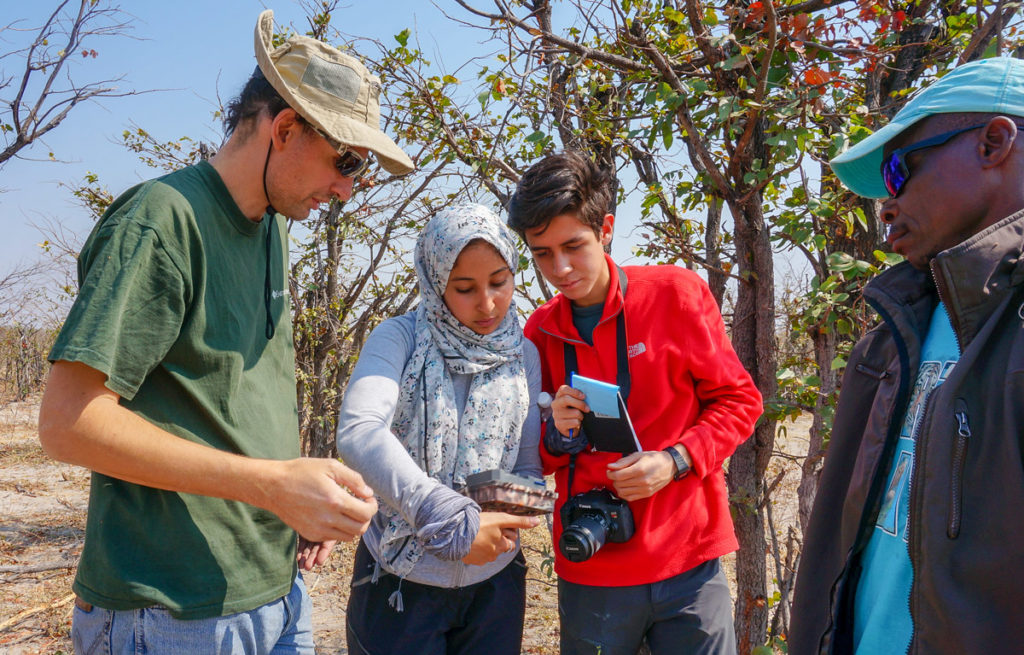
Research Methods and Stewardship are learning targets during the Conservation and Storytelling module in Botswana
At the end of the term, each student is asked to re-examine their excellency paragraph and reflect on their work and achievements during the term, and score themselves based on whether they think they met what they would consider excellency. This student reflection, along with an advisory comment, helps provide a detailed look at each student’s academic development and personal growth over their time in country. Although we do have letter grades assigned at the end of each module, these are decided on by the student and based on a critical assessment of their excellency rubrics. This is because we believe that removing a teacher-assigned letter grade makes the student more willing to risk failure and see what happens when they are willing to engage in their coursework without inhibitions — to worry not about the letter grade, but the intellectual pursuit of learning.
Mastery Assessment
Besides assessing their module work via their excellency paragraph, students are also informed of their learning targets mastery attainment at the end of each term. A student participating in the Marine and Coastal Studies module listed above would receive their rank and a detailed comment (not shown) for the following learning targets:
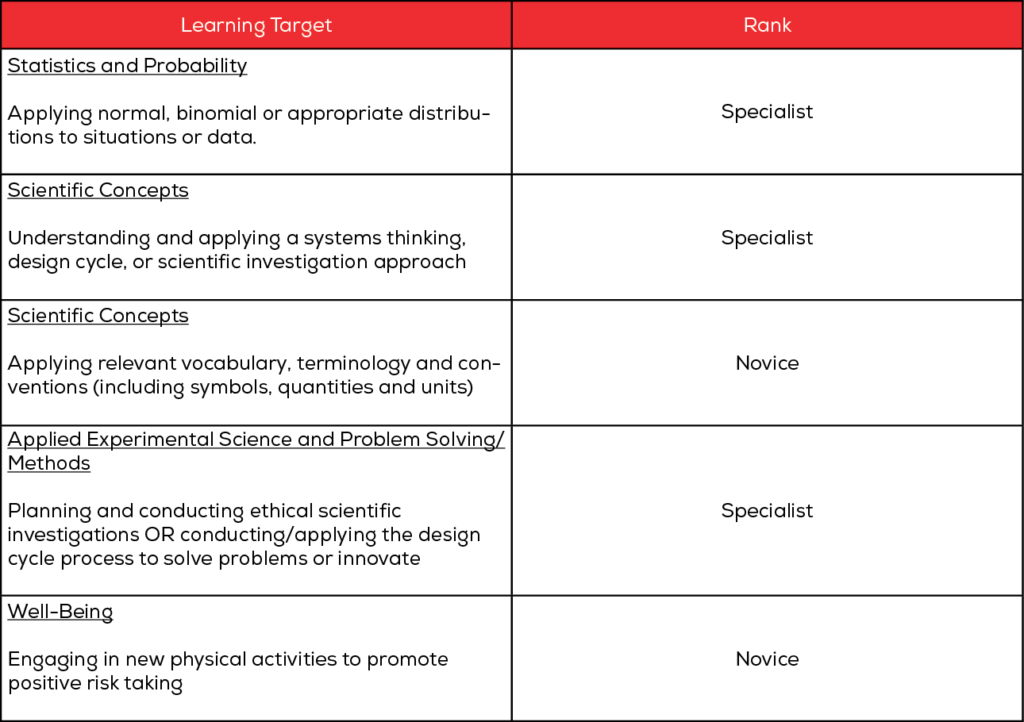
Each of the learning targets associated with a module on the report includes feedback from the educator on how the student performed during the term for the particular learning target, and suggestions for how they can continue to build on their skills and rank in subsequent terms.
Students also perform a similar analysis on their personal projects, first revisiting the excellency paragraph from the start of the term and assessing whether they thought they satisfied the goals they had set for themselves. The student, in conjunction with their advisor, will then decide if they have demonstrated the requirements to move up in skill mastery rank.
As a student progresses through countries and builds upon their skills, they will have a clear idea of what learning targets they still need to gain experience in, and which should become the focus of their mastery project. This is accomplished via our project-based learning software Headrush, which tracks each student’s skill progression. A sample of a current student’s learning skill progression can be found below.
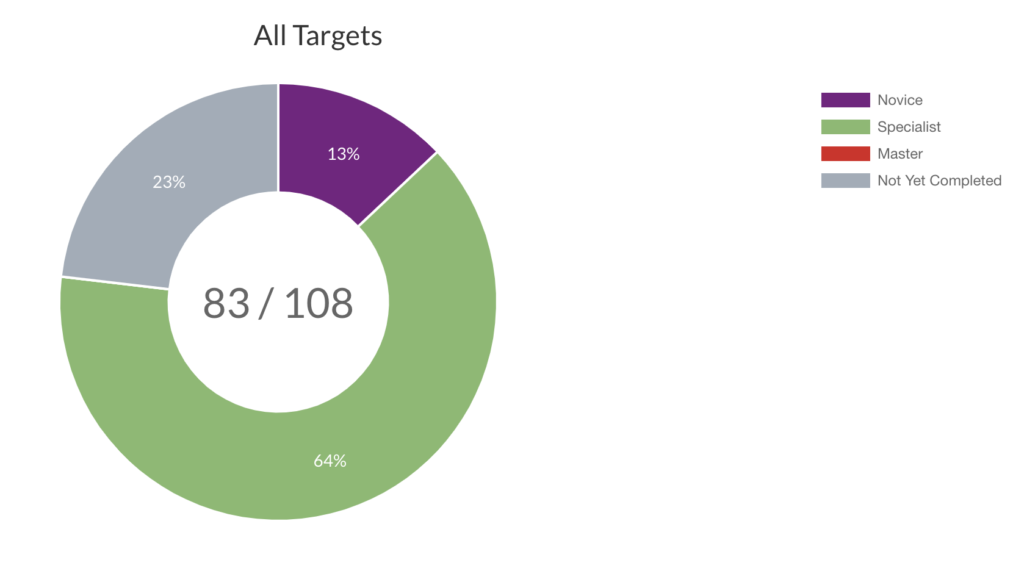
Students can see their progress on all learning targets
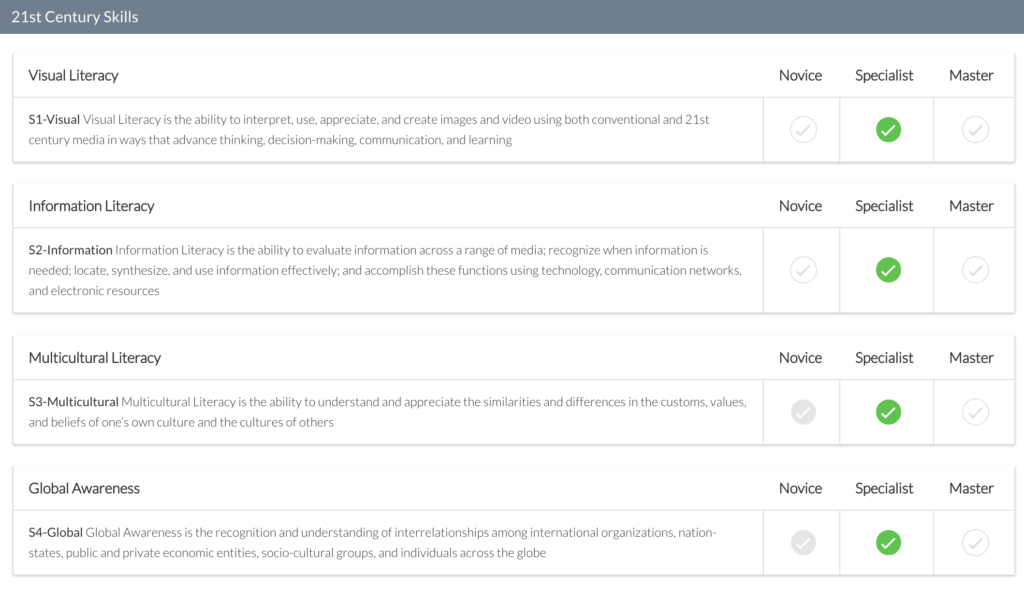
As well as a more detailed view
Summary
Have any questions about learning targets that you’d like answered? Shoot us an email at community@thinkglobalschool.org and we’ll be happy to answer them. If you’d like to learn more about THINK Global School’s innovative approach to place- and project-based learning, please visit our Changemaker Curriculum page. Ready to apply? You can do so here.